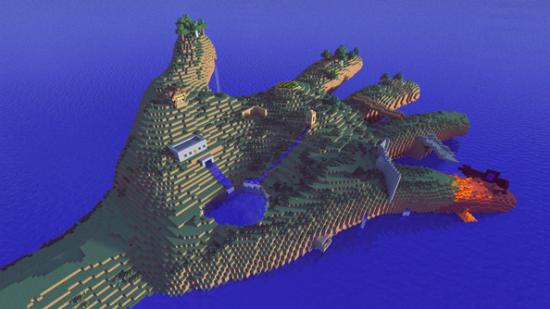Dan ‘C418’ Rosenfeld can’t resist saying what remains unsaid.
During a livestreamed interview at GameCity 2013, he shared a couch with Gone Home’s Steve Gaynor. Gaynor had offered some insight into the creative bankruptcy of AAA development, and conversation had paused for a moment. Into this clearing of natural contemplation skipped C418.
“Looking at you, [well-known AAA studio]” he added, grinning to camera.
This is Minecraft music man C418 in a nutshell – a mischievous, adolescent force for indie, cast into a spotlight he’s still adjusting to.
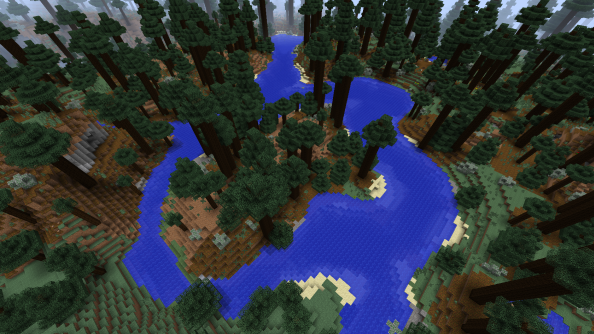
When I manage to get C418 to sit still for 20 minutes afterwards – a minor miracle, I come to realise – he’s still never more than a second away from a wired grin. There’s a distinctly teenage air about this 24 year old – perhaps because that’s when Rosenfeld found his vocation. He grew up in East Germany wanting to be a game developer – before a lax attention span led him to music.
“You have to work on a game for at least a week,” explains Rosenfeld. “But a song can be finished in an hour, if you really rush it. And even the most complex songs that I do nowadays – like the really, extremely complicated ones – they can take up to a month, but no longer than that. And if they are awful, that’s just one month of your life gone, so it’s really a smaller investment than making a game, you know?”
Uninterested at school by anything but music and computers, Rosenfeld unexpectedly found his career through his brother.
“My brother was in the same position as me: he didn’t really know what he wanted to do with his life as a teenager, so he just made graphics and kept asking me: ‘How do you like this?’, ‘How do you like that?’, and I would dismiss it and I didn’t care about it,” says Rosenfeld. “Then he started making music – he did the exact same thing and I still didn’t care, but he brought all of his music programs.”
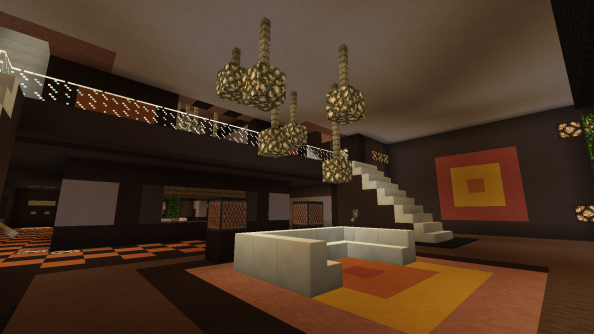
On the PlayStation, the boy who would become C418 played around with MTV Music Maker, “screwing up” the disc’s demo songs and making them “even worse”. By the time Rosenfeld was 16, his brother had stumbled upon still-popular sequencing software Ableton Live.
“When he found Ableton, he said ‘even idiots can make music with it, you should try it!’ And I felt like ‘I’m an idiot,’ or something like that, so I tried it and it was really, really good,” says Rosenfeld.
“I mean, the music I made was so awful that I wouldn’t want you to listen to it, and I don’t even have it anymore – which is really a good thing. But I kept on making music because even if the song is bad, something about making music is enjoyable.”
C418 kept on making music – and eventually, met a game developer on IRC (“a nobody, just like me”) who went by the handle Notch. Notch was working on a sandbox game with no name, in which you could place or remove blocks – or press ‘G’ to spawn a man who would walk around “like an idiot”. He thought Rosenfeld might be the man to make its sounds and music – but wasn’t specific about what he wanted.
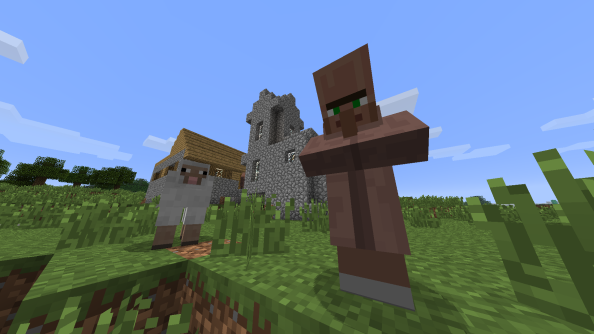
“That’s the fascinating thing about indies,” says Rosenfeld, with enthusiasm. “Most of us don’t know what we’re doing, so we’re just hoping that the other guys are as professional as us. ‘Just do whatever you want, you’ll be the boss’ – that’s the prevailing thing, I feel, that indies do a lot.”
C418 wasn’t sure whether the game would be any good. In proto-Minecraft, a world was 512×512 blocks at its furthest limits, and offered up no discoveries. But something about that miniature universe convinced Rosenfeld to say yes.
“I was able to feel like you could have stories in that little world, even though there was nothing to find, absolutely nothing,” he says. “But as [Notch] started to make more random generation, when you could find caves and stuff like that – after that I realised this could be something worthwhile.”
Minecraft exploded in popularity, of course, and C418 was standing close enough to be caught in the blast. The sSSSsss-BOOM he’d recorded for Notch’s creepers was now printed on the t-shirts of strangers he passed in the street – and sales of the fifteen minutes of music he’d put together for the game were sufficient that he could begin calling his hobby a career.
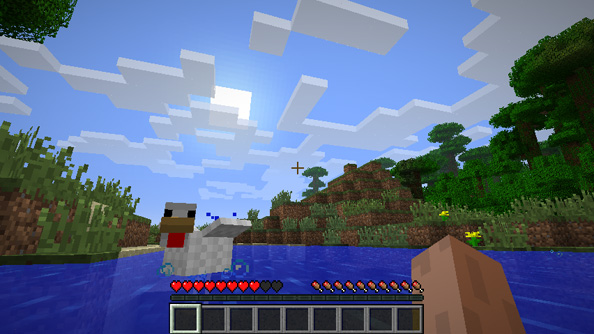
In a November update last year, another 29 tracks were added to Minecraft – a total of one hour and 40 minutes of new music. But even now, the first thing players are met with upon generating a new world is most often silence. Music in Minecraft is played at 15 minute intervals – with no in-game indication as to when it might return. The result, C418 reckons, is most often “confusion”.
“People ask themselves, ‘Where’s the music?’”, says Rosenfeld. “Then they go to the options and play with the fader, and nothing happens at all and they’re just like, ‘Okay, I guess this game doesn’t have any music, I’m just going to keep on playing’.”
And then, invariably, something happens. Through some combination of the game’s randomly generated elements, the player will wind up in a cave, or on a beach, or at the edge of a precipice – and by chance, C418’s brittle piano music will start playing.
“That’s one of the best moments in the game, I think, that you can have at all,” says Rosenfeld, proudly.
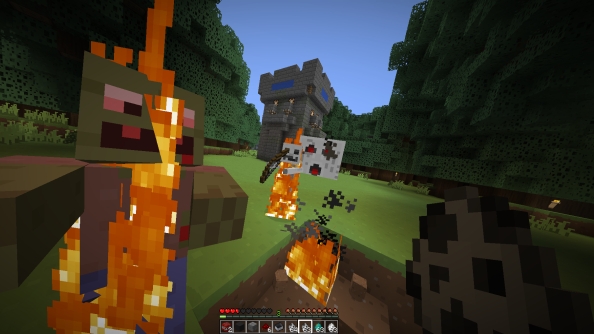
However: that same unpredictability in Minecraft has pitched Rosenfeld against challenges quite unlike those experienced by even fellow game composers, who tend to write with at least a vague scenario in mind.
“In film, you have one scene and you synchronise the music to that scene and that’s it,” Rosenfeld points out. “Minecraft is a randomly generated game, where anything can happen, and you cannot really predict what a player is doing, and the music has to fit to that.”
It’s not a challenge he believes he’s managed to overcome. But Rosenfeld has developed a style for Minecraft that he thinks is just suggestive enough – melancholic and rhythmless; “acoustic but not really, analogue but not really”.
“It’s just having this weird, calm music,” he said. “It’s enough for the players because they just make up their mind – they let their imagination flow, basically.”
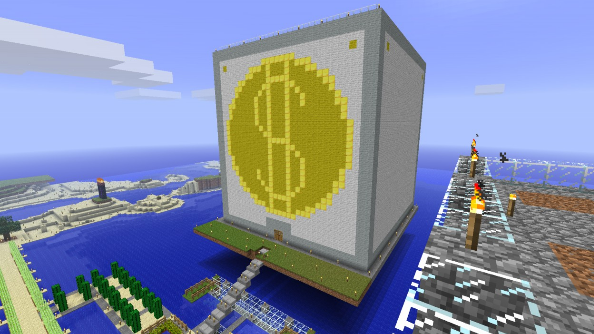
There’s a thread of teenage self-deprecation that runs right through conversation with Rosenfeld. Still unsure whether his newfound popularity is here to stay or a “little fad in this micro-bubble of indie games”, C418 looks to his music, as he always has, for a sense of validation.
“If the song is actually good, you get on that high that you’re actually worth something,” explains Rosenfeld. “Like you’re born for something – like this certain moment, you like what you’re doing. And that’s really the best thing about making music, I think, and I just keep hunting for that high as if it’s a drug.”
